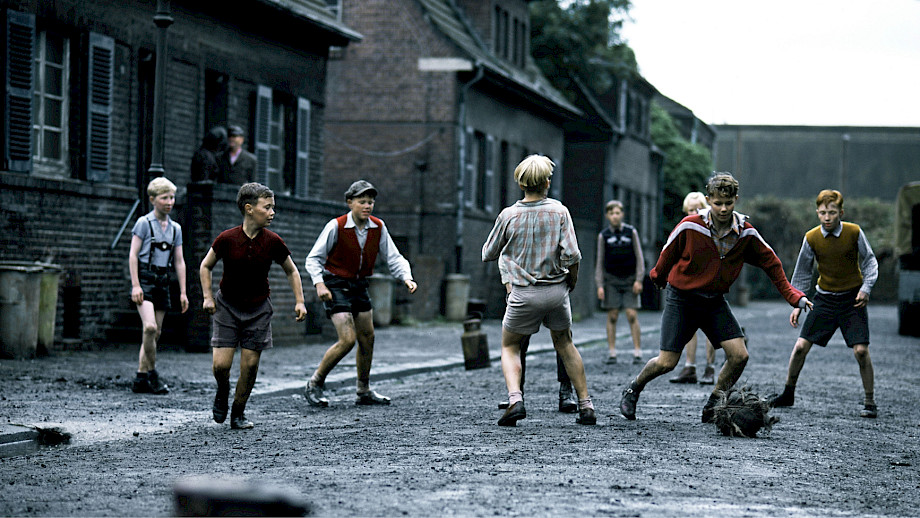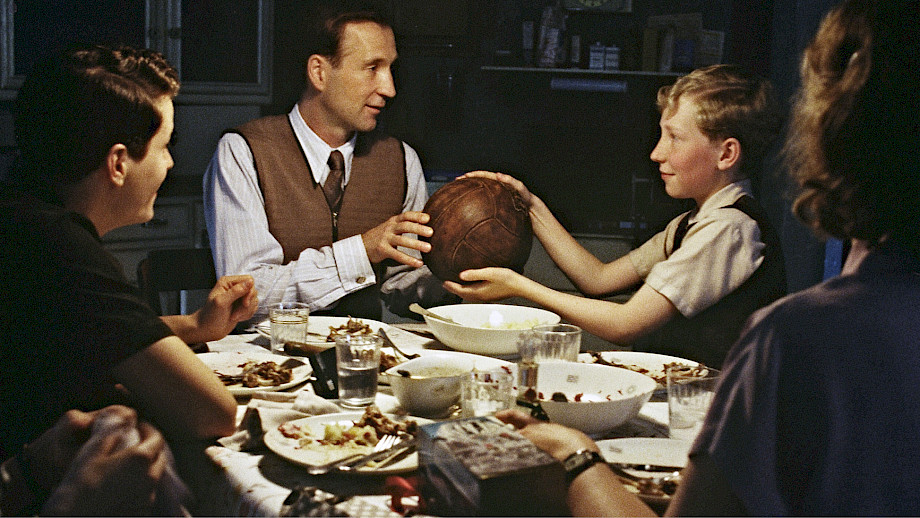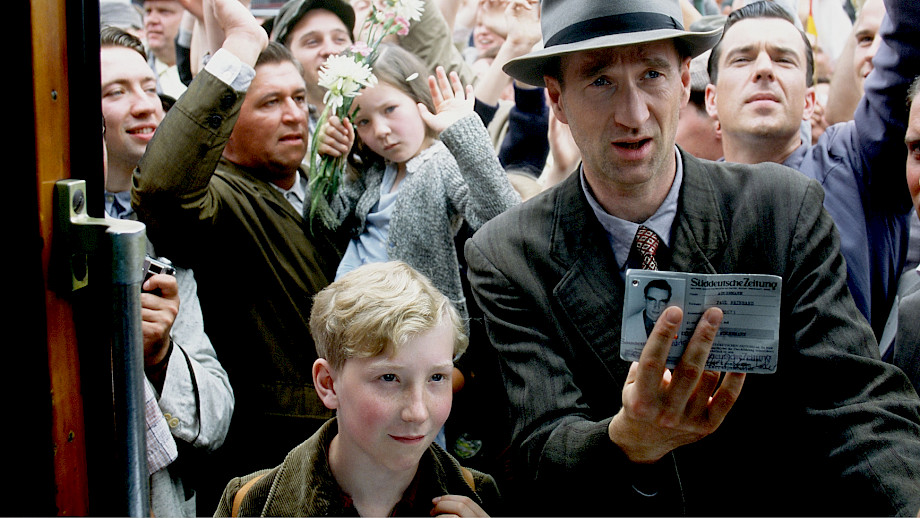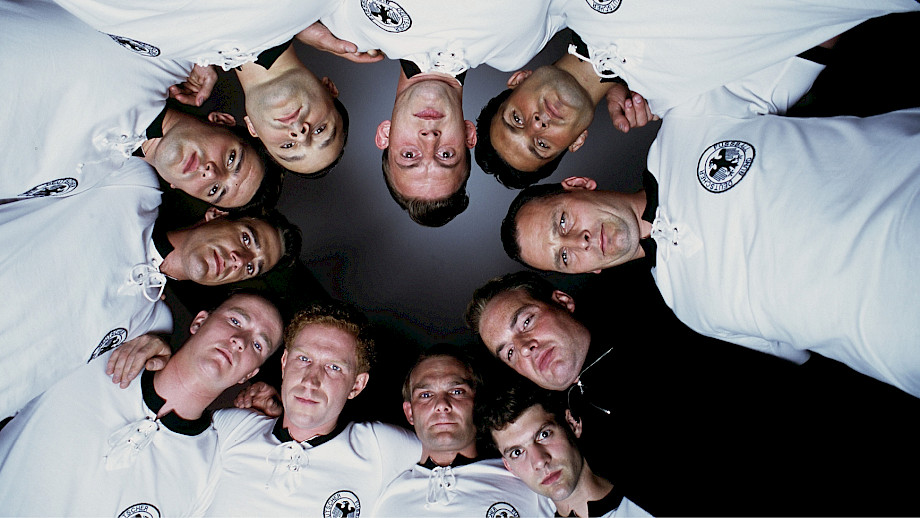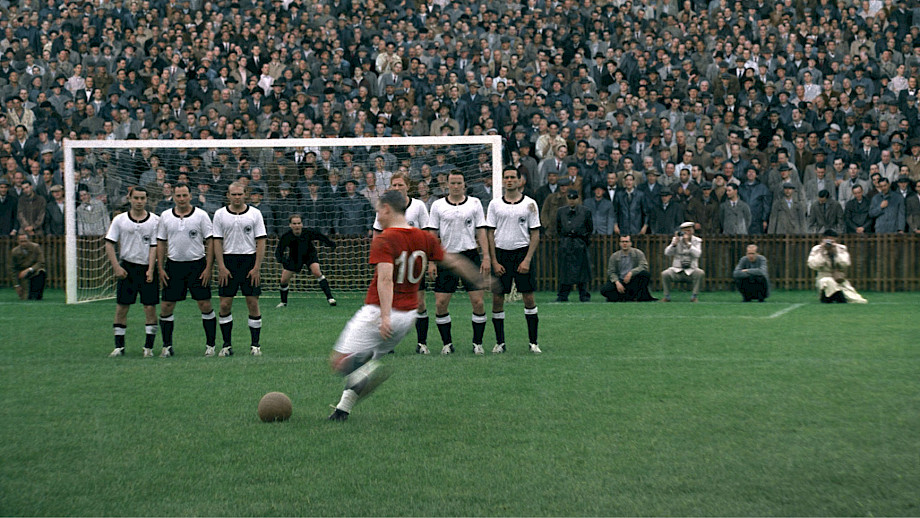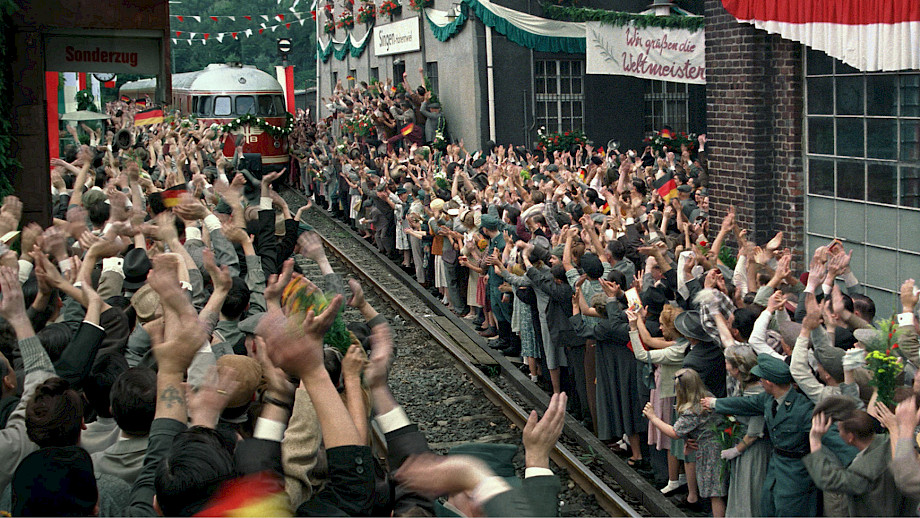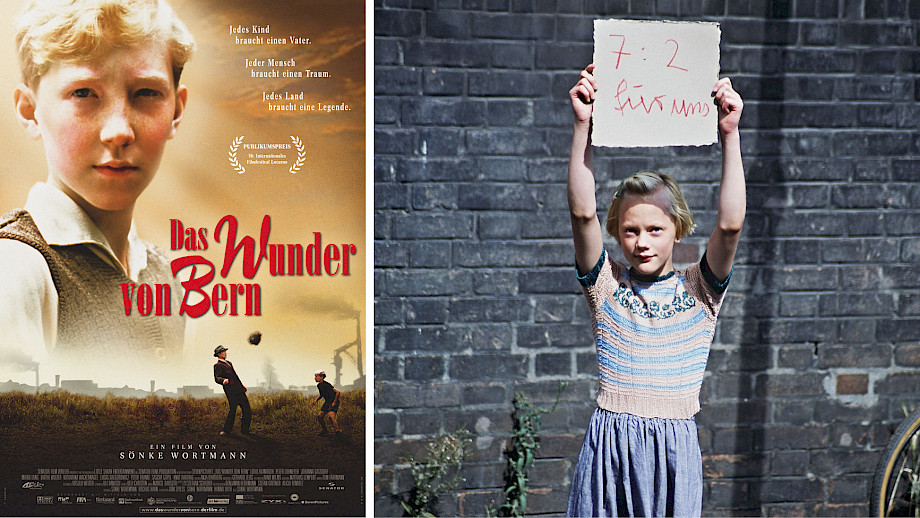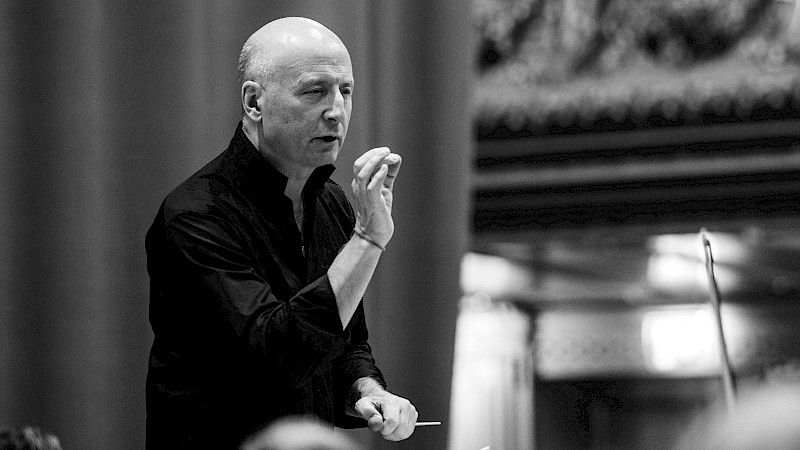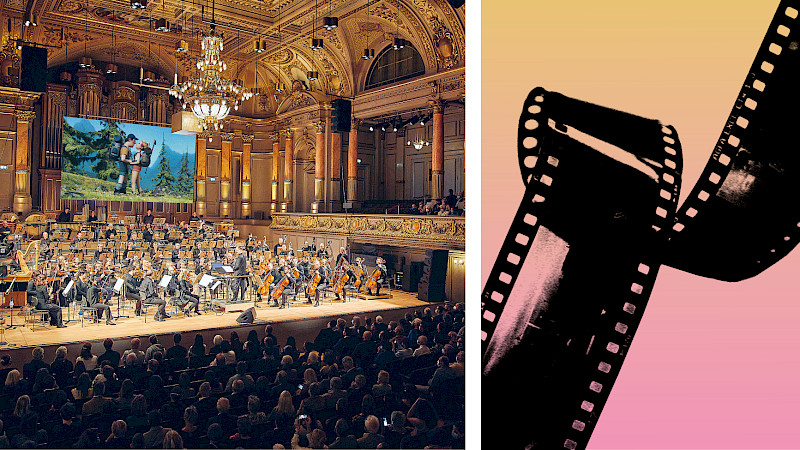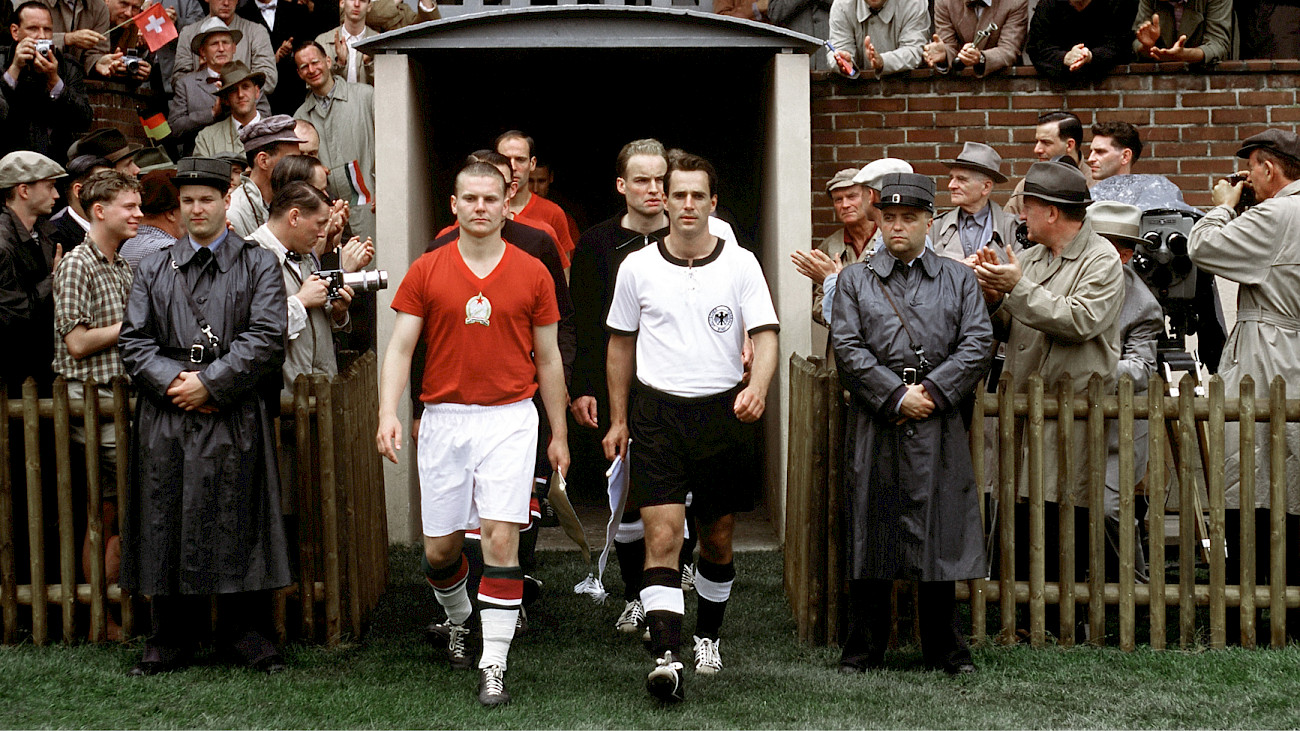
"We want to leave a good impression"
Sönke Wortmann's "The Miracle of Bern" (2003) is a sports film set against the backdrop of the 1954 World Cup in Switzerland, but also a moving family drama in post-war western Germany.
In the workers' housing estate in Essen-Katernberg, many of the brick buildings still have no windows and some of the streets are not paved. Nine years have passed since Germany lost the Second World War. The film "The Miracle of Bern" begins in the Ruhr area, in the Pott, where the tone is rough and the people have their hearts in the right place.
For Christa Lubanski, it seems like a miracle when she receives the news that her husband Richard is still alive and will return to her and their three children after eleven years in Soviet captivity. The two eldest are already grown up and 11-year-old Matthias, "Mattes", only knows his father from stories. The three of them have questions written all over their faces when the announcement is made: What will it be like with a father they hardly know anymore?
Richard arrives at the station traumatised, emaciated and a broken man. This is where Mattes and his father meet for the first time. The family then show Richard the pub that Christa and daughter Ingrid have successfully used to secure the family's income in recent years. Richard, who has lost his place as father and breadwinner due to his years of absence, walks around. He looks at a photo on the wall and wants to know: "And who's that?" Mattes' answer: "That's the boss, my best friend." Mattes then proudly explains his world to his father, in which Helmut Rahn plays the leading role. Helmut Rahn is a young man from the neighbourhood who is bursting with self-confidence. He is a footballer for Rot-Weiss Essen and - as no one realises at the time - he will make German (football) history in just a few weeks: His winning goal to make it 3:2 in the World Cup final against Hungary would see Germany become world champions in 1954.
Mattes is his biggest fan and a kind of lucky charm for Helmut Rahn. There is now an awkward silence in the pub and his older son Bruno puts it in a nutshell: "He's a kind of father figure for him." At this point, Richard realises that his family has come to terms quite well without him after the war.
In "The Miracle of Bern", Sönke Wortmann tells the story of how Richard and his son Mattes find each other through football, creating new identities, with a light and humorous tone, but also with moving scenes. Not just for the two of them, but - nine years after the end of National Socialism and the Second World War - for an entire country.
The white waistcoat
The setting for a second narrative strand is Bavaria, where the German economic miracle is already booming in contrast to the Ruhr region. Terraced houses with front gardens, a new car parked in front of each one, lavishly swinging petticoats - period colour at its finest. The editorial team at the "Süddeutsche Zeitung" is looking for a man "with a clean slate" who can be sent "down there", to Switzerland, to report on the football World Cup. Paul Ackermann is a young, ambitious and politically unencumbered journalist who seizes his chance.
The images in the third scene are really colourful and picturesque when the German national football team arrives at the hotel in Spiez. National coach Sepp Herberger (played by Peter Franke) gives out the motto in a broad and unworldly-sounding Palatinate dialect during training: "We're playing in Switzerland. We want to make a good impression there. " Over the course of the tournament, the team not only manages to persevere athletically, it miraculously makes it to the final thanks to the new type of cleats. This unexpected rise of the team is also emotionalised by Marcel Barsotti's film music, which also embraces the three narrative strands. (The Swiss film music composer and Sönke Wortmann then worked together on the cinema documentary "Deutschland. A Summer's Tale", which accompanied the German national team at the 2006 World Cup).
Football and politics
Journalist Paul Ackermann is forced to take his lively wife Annette with him to report from Switzerland. She, too, is beside herself with excitement that Germany is in the final at the Wankdorf Stadium in Bern. The young couple discuss another big topic in addition to the development of the game: the names of their future children. The score is 2:0 in favour of the favourites, Hungary, and a bet is made between the couple. Paul thinks that if Germany loses and they have a boy, "he'll be called Rüdiger, if it's a girl, Roswitha." Annette is horrified, jumps up and shouts at the top of her lungs: "Germany first, Germany first!"
The sporting, political and personal stories in "The Miracle of Bern" are emotionalised by the film music by Swiss composer Marcel Barsotti.
This leads to a chant in the stadium that intimidates the Hungarians. This scene is not only a comic moment in the film, but also echoes one of the central themes of the film: The end of the Nazi regime was less than ten years ago. Germany's reputation in the world in the mid-1950s is in tatters. "Deutschland vor" and the resulting reawakening of self-confidence has a disturbing effect. The final was broadcast on television, the first sporting event ever to be broadcast live in several countries. Winning the World Cup was undoubtedly of far-reaching political significance for the young Federal Republic of Germany, even though the then Federal President Theodor Heuss publicly and explicitly spoke out against the politicisation of the sporting event.
Louis and Gerhard
Louis Klamroth, who played the film's son Mattes alongside his real-life father Peter Lohmeyer, also realised that sport and politics have points of contact. Now in his mid-thirties, he told talk shows how, as a child, he sat next to the then German Chancellor Gerhard Schröder at an event for the film "The Miracle of Bern". Because of the emotional story, the seventh Chancellor of the Federal Republic of Germany was overcome with emotion and Louis Klamroth was at odds with himself over whether he should pat Gerhard Schröder on the knee and comfort him. Today, Louis Klamroth has probably resolved this inner conflict for himself. He has since become an award-winning political journalist, who takes well-known political figures to task in the prime-time talk programme "Hart aber fair" on German television.
And Germany and football? After 1954, there were three more World Cup titles - in 1974, 1990 and 2014 - after which the German national team's success curve fell and they never really got out of their slump. The summer of 2024 will show what the European Championship on home soil will bring. But one thing is already and forever clear: "The ball is round and the game lasts 90 minutes." And anyone who has seen "The Miracle of Bern" knows that this football wisdom from Sepp Herberger could have originated in the team hotel in Spiez.
Translated with DeepL.com




